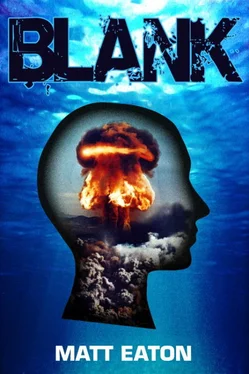Matt Eaton - Blank
Здесь есть возможность читать онлайн «Matt Eaton - Blank» весь текст электронной книги совершенно бесплатно (целиком полную версию без сокращений). В некоторых случаях можно слушать аудио, скачать через торрент в формате fb2 и присутствует краткое содержание. Год выпуска: 2015, ISBN: 2015, Издательство: Smashwords, Жанр: sf_postapocalyptic, на английском языке. Описание произведения, (предисловие) а так же отзывы посетителей доступны на портале библиотеки ЛибКат.
- Название:Blank
- Автор:
- Издательство:Smashwords
- Жанр:
- Год:2015
- ISBN:978-1-3110-4108-1
- Рейтинг книги:4 / 5. Голосов: 1
-
Избранное:Добавить в избранное
- Отзывы:
-
Ваша оценка:
- 80
- 1
- 2
- 3
- 4
- 5
Blank: краткое содержание, описание и аннотация
Предлагаем к чтению аннотацию, описание, краткое содержание или предисловие (зависит от того, что написал сам автор книги «Blank»). Если вы не нашли необходимую информацию о книге — напишите в комментариях, мы постараемся отыскать её.
Blank — читать онлайн бесплатно полную книгу (весь текст) целиком
Ниже представлен текст книги, разбитый по страницам. Система сохранения места последней прочитанной страницы, позволяет с удобством читать онлайн бесплатно книгу «Blank», без необходимости каждый раз заново искать на чём Вы остановились. Поставьте закладку, и сможете в любой момент перейти на страницу, на которой закончили чтение.
Интервал:
Закладка:
“A dozen or so. But they’re guarded by the other women. It’s quite amazing to watch.”
Mel searched the minds of several in the group closest to them – the ones whose curiosity overpowered their fear of the unknown. The power and clarity of their thoughts came as a surprise. Having expected to find empty heads, she instead found a gushing stream of information unregulated by social conditioning, self-deception or by the limitations of language. Their thoughts were not words but feelings, easy to identify because they were pure and undiluted.
The males were focused almost exclusively upon sex and sustenance. Their thoughts wavered from these themes only in order to address ways of overcoming impediments to their acquisition, such as how to rise in the hierarchy of male rivals or how to avoid being last in the food line.
The women were the key to all of this. Male social interaction was transparent in its intent. Their thoughts were precisely as indicated by their actions. There were neither lies nor deceit, except perhaps in the efforts of one or two to elicit female sympathy. This was how weaker males sought to overcome the dominance of their stronger, more aggressive rivals.
In this, curiously, they appeared to be having some success. There were groups of women apparently devoted to the care of weaker or older males. Among these females she detected empathy as a dominant emotion: it was present to some extent in virtually all the female minds she tried to examine.
There was an obvious reason for this – the females were in charge of the enclosure. They were aware of their power over the males and had united among one another in that awareness to rule the roost. There was no mistaking that dominance in their emotional states. They were confident, self-assured, even loving.
“Seems to me there are definite personality traits if you look closely enough,” Mel told the others.
“Isn’t that what Jane Goodall used to say about her gorillas?” Bell suggested.
This was more than instinct. The females were not afraid – they were organised. In this, Mel felt sure there was evidence of latent human intelligence. If nothing else, they shared a strong degree of emotional empathy. But she couldn’t help thinking their unification signalled something far deeper going on. It was almost as if they shared her enhanced ability to read minds, or at the very least to accurately read sentiment and intent.
She also knew there would be little or no point making such an observation to Bell or indeed to Luckman’s bosses in the military, for whom the question of what to do with the Blanks nevertheless posed quite a dilemma.
A small RAAF passenger jet flew low over the air base before circling for its landing approach. Most of the Blanks in the compound ignored it. Others pointed to the sky like excited children.
“I can’t say for sure what’s happening to them,” Tom demurred diplomatically. “But I’d say it’s the nature/nurture thing. We’re not simply products of what we learn. Some tendencies we’re born with – whether that’s genetic or spiritual is not my area of expertise. I have to admit I find it intriguing to watch,” he said.
A trooper approached Luckman and saluted. “Brigadier Martin has sent word he wants to see you in his office.”
Luckman had been hoping to get Mel settled in the civilian quarter.
“Go on, I’ll sort her out,” Bell assured him.
Luckman nodded and headed for the gate.
“Right, what next?” asked Mel.
“First things first, let’s hose the shit off this poor bugger,” said Tom.
Eighteen
It was only nine o’clock in the morning but the dark patches of despair under the eyes of Brigadier Jim Martin were clear evidence the man was shockingly sleep deprived. Martin had visibly aged in the few short weeks Luckman had known him. His eyes were drooping in his skull, his cheeks red and blotchy like he’d had a long night on the grog. It was instead the result of ridiculously long hours and an overburdened command. He had far too few men at his disposal for the job at hand.
With Brisbane an impossible logistical impediment, Martin had been forced to shift what remained of the 7th Brigade from Gallipoli Barracks in Enoggera to Amberley Air Base. Luckman’s hastily assembled chopper rescue unit had been grafted onto Martin’s 6 RAR Battalion with personnel and hardware from 5th Aviation Regiment in Townsville.
But the transplant was being rejected by the host. Martin had made Luckman feel about as wanted as a third testicle. The brigade CO viewed Luckman’s unit as a headache, mostly because he’d been told to leave Luckman alone. Martin saw that as undermining his authority.
Martial law had been declared within 24 hours of the initial disaster. The Australian Defence Force had assumed command of all civilian emergency authorities. It was in charge of all food supplies; no-one ate without the Army’s say-so. Brigadier Martin was making life and death decisions daily and refused to delegate the responsibility.
The Army had not yet prioritised the installation of solar panels and was relying on diesel generators for power. Computers were only being used for critical communication purposes because the power was more urgently needed for refrigeration and to treat the sick and wounded.
Administration was in the hands of young soldiers who were products of the computer age. It had been reduced to a snail’s pace. Martin’s adjutant, Corporal Touchley, had dug out some old manual typewriters from storage. Everything else was being scribbled on paper. An Army ran on its paperwork, but Martin was drowning in the stuff.
For all of these reasons the Brigadier was keen to curtail the ongoing search and rescue effort, given the increasingly desperate prognosis for the survivors (including thousands of Blanks) already under his control. Martin was an Afghanistan veteran and a religious man who reckoned that with the world in its current state there were worse things than death. He was among those who had quietly come to view global events as Armageddon. It was an increasing irritant to the Brigadier that Luckman had ignored his wishes by continuing to bring in a regular stream of survivors.
Luckman offered his superior a salute. “Morning, Brigadier.”
Martin glanced up briefly, saluted dismissively and returned his attention to the pile of paperwork. “What is it, Captain?”
“You sent for me, sir.”
Martin looked up again.
“Yes, I’m aware of that,” he replied dryly. “I meant what is it he wants from you?”
“He?”
“Your old boss, General Shearer.”
“He’s here?”
“He asked for you. Any idea why?
“Sorry, can’t help you there.”
“I don’t like surprises, Luckman.”
There was a knock on the door and Corporal Touchley popped his head in.
“The General’s here, sir.”
Martin waved his hand to beckon him in and Touchley pushed open the door.
The golden oak leaves adorning Shearer’s bright red gorget patches gleamed with authority. He smiled when he recognised Luckman and held out his hand. Luckman hesitated, saluted quickly then accepted the handshake.
“Good to see you, Captain Luckman.”
Shearer stepped toward Brigadier Martin, who had risen to his feet to salute.
“Welcome to Brisbane, General. Pleasant flight?” Martin asked, his tone vaguely derogatory.
Shearer saluted back without bothering to offer another handshake. He grabbed a seat in front of Martin’s desk.
“Corporal, coffee if you don’t mind.”
Touchley nodded and closed the door behind him.
“How’s life in Canberra?” Luckman asked.
“A shit fight, as I’m sure you’ve heard.”
Luckman smiled politely. With Canberra being so far inland it had been one of the few national capitals of the world to remain intact. Unfortunately, while no-one in the city died from the twin cataclysms, the vast majority of them were turned Blank by the Sunburst. Within days, most had found their way to Lake Burley Griffin in the city centre. But while the lake was a large and open source of fresh water it was also prone to the city’s pollutant run-off. It certainly wasn’t fit for consumption by people who had spent a lifetime drinking treated tap water. Within a week, virtually all of Canberra’s Blank population was suffering dysentery. They shat themselves to death in the tens of thousands.
Читать дальшеИнтервал:
Закладка:
Похожие книги на «Blank»
Представляем Вашему вниманию похожие книги на «Blank» списком для выбора. Мы отобрали схожую по названию и смыслу литературу в надежде предоставить читателям больше вариантов отыскать новые, интересные, ещё непрочитанные произведения.
Обсуждение, отзывы о книге «Blank» и просто собственные мнения читателей. Оставьте ваши комментарии, напишите, что Вы думаете о произведении, его смысле или главных героях. Укажите что конкретно понравилось, а что нет, и почему Вы так считаете.












